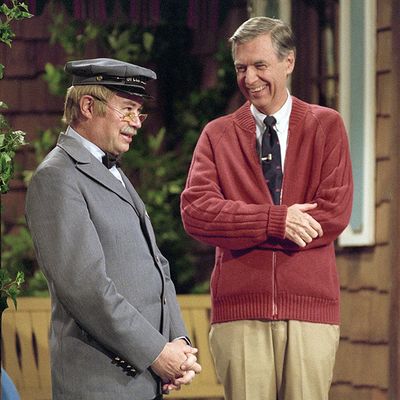
Side by side in the multiplex with giant blowups of Han Solo and various Avengers is Fred Rogers, the subject of Morgan Neville’s surprisingly moving Won’t You Be My Neighbor? You ask: How can a man so square now be so hip, maybe even — with any luck — big box office? Neville gently — how could one not be gentle in this context? —eases us into a neighborhood-as-world in which all talk is soft; all fantasy is plainly handmade, as if by a child in a playroom; and the most important thing we’re meant to take away is that no matter how we look or feel (sad, mad, plaid), we’re special, each of us, loved unconditionally by this nice, nice man. If you’re looking for an ironic punch line to the above sentiment, look elsewhere.
I’m not a Mister Rogers’ Neighborhood newbie. When I was a kid, I wrote him a fan letter. The odd thing is that I was going on 11, past the age most kids would admit to watching the show, but I’d go back and forth between the ol’ neighborhood and Dark Shadows, along with other noisy, violent programs. Neville’s documentary brought it all back. There he is, breezing through the front door, jauntily trading his shoes for sneakers and sports coat for a button-down or zip-up sweater. I loved him then because he seemed to me like an uncle who was a little — don’t take this the wrong way — slow, in the sense that he wasn’t in sync with the fast-and-getting-faster times. He was so not in sync that he seemed radical, a word that’s used in the film by the actress who played Mrs. McFeely, the postman’s wife. Also, I liked knowing Mister Rogers would never be a critic — a grim thing for a righteous critic to admit, but psyches are complicated.
Neville reminds us that Fred Rogers was an ordained Presbyterian minister who made sure not to put God — at least explicitly — into his programs. But he felt that he was a missionary. For Rogers in the late 1960s, spiritual healing meant, in the words of one of the show’s directors, “[taking] all the elements that make good television and [doing] the exact opposite.” There were a lot of contented silences, as critic David Bianculli points out. But Neville also reminds us that the Land of Make Believe (reached via trolley) was not a place of escapism. The first week on the air, King Friday XIII established a border guard, and it fell to Lady Aberlin (who’s not in this film, alas) and others to teach him that even a king could welcome the stranger in need. On the live side of the trolley, the neighborhood policeman (François Clemmons) was black, and in one momentous scene he and Rogers dipped their bare feet into a wading pool — not long after the era of segregated swimming pools. (Rogers was upset when Clemmons was spotted at a gay bar because he didn’t think his sponsors could handle it — but he did, eventually.) Out from behind the TV, Rogers charms a snide congressional-committee chairman with his message of kindness — and single-handedly ensures $20 million in 1960s dollars for the fledgling PBS.
Neville is a little smug in cutting to such hosts as Soupy Sales and Pee-wee Herman to prove that kids’ TV can be overly loud and brutal. Kids need the antic and unruly as much as they need the soft acceptance of Fred Rogers. But there is no doubt that we miss him, badly. Won’t You Be My Neighbor? is a wonderful breather from reality, from which you come back more conscious of — and dismayed by — the hate that more than ever runs the world.
*This article appears in the June 11, 2018, issue of New York Magazine. Subscribe Now!


